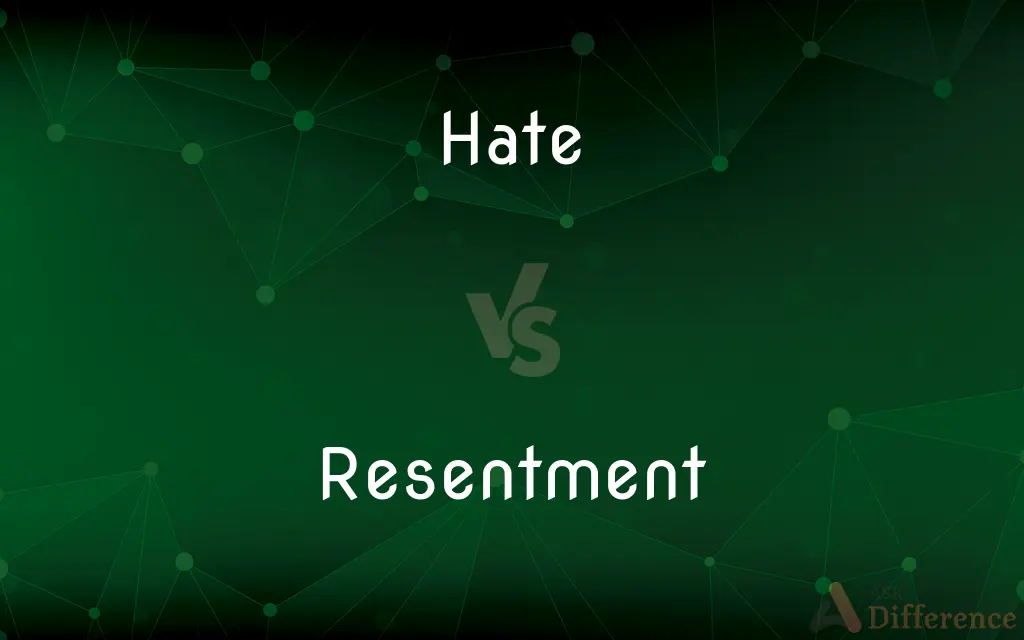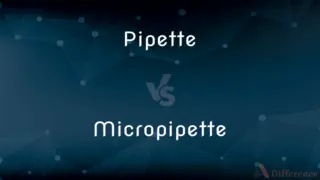Hate vs. Resentment — What's the Difference?
Edited by Tayyaba Rehman — By Urooj Arif — Updated on April 3, 2024
Hate is an intense dislike or hostility towards something or someone, while resentment is a feeling of bitterness or indignation from being treated unfairly.

Difference Between Hate and Resentment
Table of Contents
ADVERTISEMENT
Key Differences
Hate encompasses an intense emotional aversion, often leading to active hostility towards its object, whether a person, group, or concept. On the other hand, resentment is more about harboring silent bitterness or anger due to perceived wrongs or injustices, without the outward aggressiveness that characterizes hate.
While hate can be immediate and visceral, often stemming from deep-seated prejudices or conflicts, resentment usually develops over time, growing from specific instances of perceived unfairness or hurt. Resentment may simmer internally, influencing one’s feelings and attitudes quietly, whereas hate is more likely to manifest in overt expressions or actions.
Hate is a broader, more consuming emotion that can be directed towards anything from personal rivals to entire categories of people or concepts, fueled by various factors including fear, envy, or ideological differences. Resentment, however, is typically more personal and specific, rooted in particular events or actions that have caused the individual to feel slighted or undervalued.
The consequences of hate can be far-reaching, potentially leading to acts of aggression, discrimination, or violence. Resentment, while it may not always lead to direct harm, can erode personal relationships, contribute to mental health issues, and foster a pervasive sense of dissatisfaction or unhappiness.
In coping mechanisms, individuals dealing with hate may seek justification for their feelings or look for ways to act on them, which can perpetuate cycles of animosity and conflict. Those feeling resentment might focus on the source of their bitterness, often struggling with the inability to let go of past grievances, which can hinder personal growth and healing.
ADVERTISEMENT
Comparison Chart
Definition
Intense dislike or hostility towards something or someone.
Bitterness or indignation from being treated unfairly.
Emotion Type
Immediate, visceral.
Grows over time, simmering.
Directed Towards
Broad: people, groups, concepts.
Specific: particular events or actions.
Root Cause
Prejudices, conflicts, ideological differences.
Perceived wrongs, unfair treatment.
Manifestation
Overt aggression, discrimination.
Internal bitterness, silent anger.
Consequences
Potential for violence, discrimination.
Erodes personal relationships, mental health issues.
Coping Mechanisms
Seeking justification, acting on feelings.
Struggling with past grievances, inability to let go.
Compare with Definitions
Hate
Intense aversion to someone or something.
He felt an uncontrollable hate towards injustice.
Resentment
Silent indignation holding onto past wrongs.
His resentment towards his partner was palpable.
Hate
Hostility that can lead to aggression.
The hate between rival factions led to open conflict.
Resentment
Bitterness from unfair treatment.
Resentment grew within her after being overlooked for promotion.
Hate
Can manifest in harmful actions.
Acts of hate are unfortunately common in conflicts.
Resentment
Impacts mental health and relationships.
Their relationship suffered under the weight of mutual resentment.
Hate
An emotion that can fuel discrimination.
Hate for certain groups fosters societal division.
Resentment
Often specific to situations or individuals.
Resentment festered after the unfair distribution of inheritance.
Hate
Often based on irrational fears or prejudices.
His hate was rooted more in misunderstanding than in fact.
Resentment
Can lead to a sense of victimhood.
Constant resentment made her feel like a perpetual victim.
Hate
To feel strong dislike for or hostility toward
Rivals who hate each other.
Resentment
Resentment (also called ranklement or bitterness) is a complex, multilayered emotion that has been described as a mixture of disappointment, disgust, anger, and fear. Other psychologists consider it a mood or as a secondary emotion (including cognitive elements) that can be elicited in the face of insult and/or injury.Inherent in resentment is a perception of unfairness (i.e.
Hate
To feel dislike or distaste for
Hates washing dishes.
Hates to get up early.
Resentment
Indignation or ill will stemming from a feeling of having been wronged or offended.
Hate
To be disinclined (to do something) out of politeness or a need to apologize
I hate to interrupt, but can I ask you a quick question?.
Resentment
Anger or displeasure stemming from belief that one has been wronged or betrayed by others; indignation.
Hate
To feel hatred.
Resentment
(obsolete) The state of holding something in the mind as a subject of contemplation, or of being inclined to reflect upon it; feeling; impression.
Hate
Intense animosity or dislike; hatred.
Resentment
(obsolete) satisfaction; gratitude
Hate
An object of hatred.
One of my pet hates is traffic wardens.
Resentment
The act of resenting.
Hate
Hatred.
He gave me a look filled with pure hate.
Resentment
The state of holding something in the mind as a subject of contemplation, or of being inclined to reflect upon something; a state of consciousness; conviction; feeling; impression.
He retains vivid resentments of the more solid morality.
It is a greater wonder that so many of them die, with so little resentment of their danger.
Hate
(Internet slang) Negative feedback, abusive behaviour.
There was a lot of hate in the comments on my vlog about Justin Bieber from his fans.
Resentment
In a good sense, satisfaction; gratitude.
The Council taking notice of the many good services performed by Mr. John Milton, . . . have thought fit to declare their resentment and good acceptance of the same.
Hate
(transitive) To dislike intensely or greatly.
Resentment
In a bad sense, strong displeasure; anger; hostility provoked by a wrong or injury experienced.
Resentment . . . is a deep, reflective displeasure against the conduct of the offender.
Anger is like A full-hot horse, who being allowed his way,Self-mettle tires him.
Can heavently minds such high resentment show,Or exercise their spite in human woe?
Hate
(intransitive) To experience hatred.
Do not fear; he who fears hates; he who hates kills. — attributed to Gandhi
Resentment
A feeling of deep and bitter anger and ill-will
Hate
To have a great aversion to, with a strong desire that evil should befall the person toward whom the feeling is directed; to dislike intensely; to detest; as, to hate one's enemies; to hate hypocrisy.
Whosoever hateth his brother is a murderer.
Hate
To be very unwilling; followed by an infinitive, or a substantive clause with that; as, to hate to get into debt; to hate that anything should be wasted.
I hate that he should linger here.
Hate
To love less, relatively.
Hate
Strong aversion coupled with desire that evil should befall the person toward whom the feeling is directed; as exercised toward things, intense dislike; hatred; detestation; - opposed to love.
For in a wink the false love turns to hate.
Hate
The emotion of hate; a feeling of dislike so strong that it demands action
Hate
Dislike intensely; feel antipathy or aversion towards;
I hate Mexican food
She detests politicians
Common Curiosities
How do hate and resentment differ in manifestation?
Hate often results in overt aggression or discrimination, while resentment typically simmers internally, affecting attitudes and feelings.
Can resentment lead to hate?
Yes, if unresolved, resentment can escalate into hate, especially if the underlying issues are compounded by further grievances.
How can one cope with hate?
Coping with hate may involve reflection, seeking understanding, and finding constructive ways to address the underlying causes.
Is hate always obvious?
While often overt, hate can also be subtle, manifesting in passive aggression or discrimination that's not immediately apparent.
What is resentment?
Resentment is a feeling of bitterness or indignation due to perceived unfair treatment.
What causes hate?
Hate can be caused by a variety of factors, including fear, envy, conflicts, and deep-seated prejudices.
How do societies address hate?
Societies may address hate through education, dialogue, and policies aimed at promoting understanding and tolerance.
What is hate?
Hate is an intense emotional aversion or hostility towards a person, group, or concept.
Are there positive aspects of hate?
While generally viewed negatively, the intensity of hate can sometimes motivate individuals to address underlying issues or injustices, albeit in more constructive ways than the emotion itself might suggest.
Can resentment affect physical health?
Yes, chronic resentment can lead to stress-related health issues, including heart disease and high blood pressure.
How can one overcome resentment?
Overcoming resentment typically requires forgiveness, letting go of past grievances, and addressing the sources of unfair treatment constructively.
Can resentment be justified?
Resentment can be based on genuine experiences of unfair treatment, making it understandable, though not necessarily productive in its raw form.
What causes resentment?
Resentment is caused by perceived wrongs or unfair treatment, often stemming from specific incidents or patterns of behavior.
What role does communication play in resolving resentment?
Communication is crucial in resolving resentment, as it allows for the airing of grievances and the potential for reconciliation.
What is the impact of hate on communities?
Hate can severely impact communities, leading to divisions, violence, and a breakdown in social cohesion.
Share Your Discovery

Previous Comparison
Resurrection vs. Revival
Next Comparison
Pipette vs. MicropipetteAuthor Spotlight
Written by
Urooj ArifUrooj is a skilled content writer at Ask Difference, known for her exceptional ability to simplify complex topics into engaging and informative content. With a passion for research and a flair for clear, concise writing, she consistently delivers articles that resonate with our diverse audience.
Edited by
Tayyaba RehmanTayyaba Rehman is a distinguished writer, currently serving as a primary contributor to askdifference.com. As a researcher in semantics and etymology, Tayyaba's passion for the complexity of languages and their distinctions has found a perfect home on the platform. Tayyaba delves into the intricacies of language, distinguishing between commonly confused words and phrases, thereby providing clarity for readers worldwide.














































